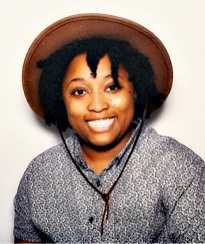An official website of the United States government
 United States Department of Labor
United States Department of Labor
| November 2016
Lanae Spruce stays on top of the latest trends. And whether posting, tagging, or tweeting, she always shows she’s in the know.
Lanae is a social media specialist for the Smithsonian Institution’s new National Museum of African American History and Culture in Washington, D.C. She uses social media to promote the museum’s mission and vision. Like others in her field, Lanae links the subject of her work with current events. “There’s always something going on in real time,” she says, “and we try to enhance the conversation through the perspective of our museum.”
Social media specialists communicate with the public through platforms that allow users to create and share content online. They run their employers’ social media accounts, working to build a brand’s reputation.
These workers post content—such as images, text, or videos—to spark interest in a topic that relates to the brand as a whole. For example, Lanae might share photos from the museum’s exhibit of music history. “I make sure all of our social platforms are telling stories about our museum that people can relate to,” she says.
In addition, social media specialists follow conversations and interact with the public online. “You never know what to expect, especially when dealing with online content,” says Lanae. “A fun hashtag might pop up and, if appropriate, we find ways to respond and share our content.”
These workers sometimes collaborate with others to promote their employer’s cause. For example, they might work on a team with marketing consultants to publicize an event.
To track the effectiveness of their communication strategies, social media specialists set goals and then measure success against those goals. For example, Lanae might aim for a social media campaign post to be shared 40 times and then use an online tool to analyze the results.
To work as a social media specialist, you’ll need certain skills, education, and other qualifications.
Skills. At a minimum, you must be familiar with social media platforms. You should also be comfortable using networking tools, such as ones designed to post across several social media accounts.
Equally important is the ability to understand your audience and its interests. “It goes back to seeing what fans are talking about,” says Lanae, “and knowing your audience and what it expects from you.” If your audience is concerned about an issue that you don’t address, for example, you’re not being effective.

Creativity and communication skills are also key for presenting familiar content in interesting ways. “We’ve told the story a million times before,” says Lanae, “but we’re always looking for a new angle, a new way to keep people engaged.”
And you should be able to make judgment calls quickly, particularly when handling sensitive topics. “You have to always be aware of what’s going on,” says Lanae. “If there’s a natural disaster, you don’t want to be tweeting about what was on TV last night.”
Education. To become a social media specialist, you typically need a bachelor’s degree. You should expect to study subjects such as public relations, communications, and business. Lanae has a bachelor’s degree in journalism and a master’s degree in Internet marketing, which gives her a solid foundation for both the writing and promoting she does in her job.
While in school, you may consider pursuing an internship or activities that show your leadership, writing, or social media expertise. Touting those accomplishments may make you more attractive to future employers—especially for your first job after graduating.
Other preparation. Employers often prefer to hire workers who have worked in social media, public affairs, or a related field. Lanae gained experience after college by working for an online business, using social media to respond to customers.
You might learn about social media use on your own, supplementing what you already know with what you read online. Taking classes or earning certifications may boost your credentials even more.
Managing an employer’s social media accounts is often more challenging than managing personal accounts. But there’s plenty to enjoy about the work.
Day to day. As a social media specialist, you’ll interact with the public in lots of different ways. One minute, you might be fielding criticism; the next, you’ll respond to positive feedback.
Throughout it all, you must maintain a professional tone and keep your employer’s best interests in mind. “You have to make sure that whatever you’re posting reflects the brand’s mission and goals,” says Lanae, “and you have to have a strategy.”
Constantly monitoring the brand’s reputation and keeping up with current events may be all-consuming. That can be both bad and good. “It can be a challenge for your personal life,” says Lanae. “But the real-time piece that makes my job hard also makes it fun.”
Jobs and pay. The U.S. Bureau of Labor Statistics (BLS) groups social media specialists with other types of public relations specialists. These workers might go by a various job titles, including digital engagement specialist, social media strategist, and online community manager.
In May 2015, there were about 218,910 public relations specialists working in wage and salary jobs, according to BLS. Their median annual wage was $56,770, higher than the $36,200 median for all workers. These data do not include employment and wages of self-employed workers.
Finding work. Increased use of social media as a way for businesses to communicate with the public may mean that you’ll find ample opportunities for work. But because of social media’s popularity, you may encounter competition for those jobs.
Lanae suggests staying up to date on social platforms and trends. “Follow some of your favorite brands and watch what they do,” she says. “As social media evolves and grows, you need to constantly look for ways to be better.”
Elka Torpey, "Social media specialist," Career Outlook, U.S. Bureau of Labor Statistics, November 2016.